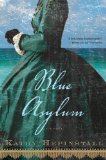Summary | Excerpt | Reading Guide | Reviews | Beyond the Book | Readalikes | Genres & Themes | Author Bio

A Novel
by Kathy Hepinstall1
When Iris dreamed of that morning, the taste of blood was gone, and so was the odor of gunsmoke, but her other senses stayed alive. The voices around her distinct. The heel of a bare foot between her ribs. The pressure of the pile of bodies on her chest. Was this what the others had felt too, as they died around her? Her dream followed the reality so well that when the bodies were yanked away from her, one by one, the weight released and the darkness cleared, and she jerked upright, gasping, on the floor of a jail cell in Fort Lane. She'd been given a blanket and nothing else, not even a pillow, for she had been judged insane even before the trial began, and her jailers followed the logic that the mad shunned the comforts of the rational. When she awoke on the floor, on that cold blanket, she thought first of the man who had murdered those innocent people by the barely crawling light of dawn, but her rage held down something deeper, something that searched for oxygen to speak. Her trial lasted less than an hour. The judge didn't want to hear her story. None of it mattered: The wayward turkeys that ran into the woods. The porcelain tub full of bloody water. The pale, blue-eyed baby. The two small graves. Her fate had already been decided. She was convicted and sentenced and put on a train to Savannah with an armed guard, from there sent on a series of trains going west, and when the tracks ran out she was taken by open-air coach to the port at Punta Rassa.
On the last leg of her journey, she set sail for Sanibel Island on the Scottish Chief, which also carried a hundred head of cattle. She had been allowed to bathe and put on a traveling dress with ornamental braids and her best spoon bonnet. She had even been allowed to bring her best clothes with her in a steamer trunk. But she had not been allowed to tell the story that would have excused or at least explained her actions.
The ship was stifling hot. The scent of the cattle rose up from the hull below her, their excrement and fear. She smoothed her hair and tried to steady her breathing. She looked out to the calm flat sea and tried to be just as calm and flat herself, so that others could see there had been a mistake.
This feeling of hatred for her husband, Robert Dunleavy, had to be contained. The judge had seen it, and it had influenced him. Frightened him, even. Wives were not supposed to hate their husbands. It was not in the proper order of things. And so she worked on this too, buried the hatred, for now, in an area of Virginia swampland where the groundwater was red.
The lows of restless cattle came up through the floorboards. They would go on to Havana, where they would be slaughtered.
"How much longer?" she asked the guard.
"Not long."
The ship churned slowly through the water. A large bird dove at the surface and came back up with a struggling fish. She nodded, her lids closing, and took refuge in a gray-blue sleep.
She awakened as the ship was docking.
"We're here," said the guard.
She stood and he bound her hands in front of her with a silk scarf.
"I'm sorry," he said. "Regulations."
He took her wrist gently and led her out to the gangplank, where she paused, amazed at the sight. Beautiful white sand beaches stretched into the distance. Palmettos grew on the vegetation line, and a sprawl of morning glories lay, still open, on the dunes. Coconut palms flanked the perimeter of the building itself, a huge two-story revival with Doric columns and tiered wings that jutted out on either side. A courtyard had been landscaped with straight columns of Spanish dagger. On the building, a sign:
SANIBEL ASYLUM FOR LUNATICS
A judge had signed the order. A doctor had taken her pulse and looked into her eyes and asked her a series of questions and confirmed that yes, something in her mind was loose and ornery, like a moth that breaks away from the light and hides instead in the darkness of a collar box. The heat made her shudder. Her dress was wet in the back. She moved her eyes away from the sign and noticed a blond boy and a large Negro man fishing in the surf. Both of them stared at her. The man was so black he made the pale boy beside him look like a ghost. The boy kept touching something on his cheek.
Excerpted from Blue Asylum by Kathy Hepinstall. Copyright © 2012 by Kathy Hepinstall. Excerpted by permission of Houghton Mifflin Harcourt. All rights reserved. No part of this excerpt may be reproduced or reprinted without permission in writing from the publisher.




Second hand books are wild books...
Click Here to find out who said this, as well as discovering other famous literary quotes!
Your guide toexceptional books
BookBrowse seeks out and recommends the best in contemporary fiction and nonfiction—books that not only engage and entertain but also deepen our understanding of ourselves and the world around us.